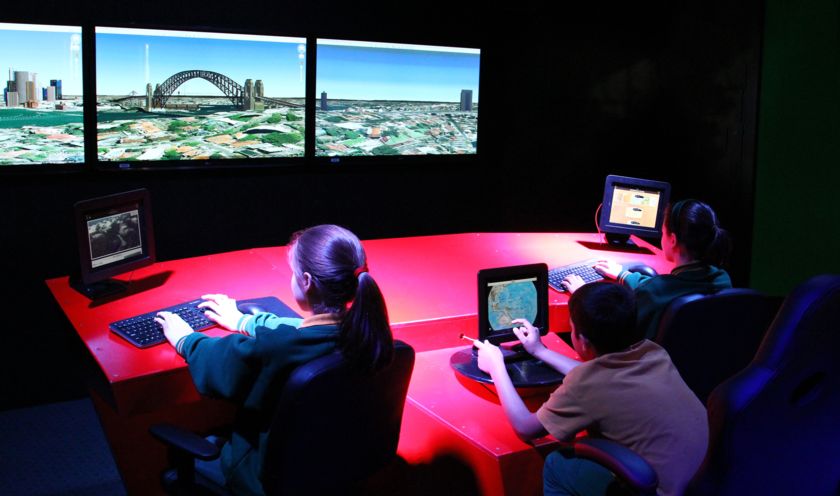-----Original
Message-----
From: Trotter, Raymond RA [mailto:Trotter.Raymond.RA@edumail.vic.gov.au]
Sent: Wednesday, January 04, 2012 2:18 AM
To: Bob Pearlman
Subject: RE: Wooranna Park Primary School Web Profile
Hello Bob
Thank you for your flattering email. Creating attractive websites
is not a strength of mine, so I appreciate what you have created.
Unfortunately, the pictures of Wooranna Park you have used are rather
staid by comparison to the learning environments we have been trying
to create in recent years.
Not long ago I sent Randy Fielding a copy of a short TV presentation
featuring a "Dragon Boat" we had build in our Year 2 Learning
Unit. The Dragon Boat has five distinct learning areas – Science
ICT, Workshop Area, Reading Cubby and Dark Room. The impact of building
a large “Dragon Boat” in the Unit has been quite profound
and has encouraged the school to build a new Year 3 Unit featuring
a Space Ship, in an old hall. This too has generated extensive interest
even though it won’t open until the start of the 2012 school
year. We call features like the Dragon Boat and Spaceship, 'Stimulating
Learning Platforms', and we hope to research the impact of such environments
on our school community with Monash University in the coming months.
The Dragon Boat capitalises on children’s imagination to
take their boat on voyages using Google Sea, or as in the case of
the new Year 3 Unit, take voyages through space. These imaginary voyages
place children in life-like situations in which they are forced to
grapple with complicated mathematical and scientific principles. How
far is it to New Zealand? What direction do I turn the boat’s
compass to? How fast are we travelling? How long will it take to get
there? Our children are also learning Morse code and communicating
via naval flags.
We believe that our Year 2 Unit, along with the new Year 3 Unit,
is a significant step forward in using young children’s imagination
to create life-like experiences. The learning involved is highly experiential
and interdisciplinary and often involves students from other year
levels. One of our senior students is writing a story book about the
Dragon Boat. Our Year 2 students were captivated when the first draft
of the book was read to them!
Our planned research is not so much about proving that the Stimulating
Learning Platforms, built in our Year 2 and 3 Learning Units, have
impacted positively on students, teachers and parents. Rather it is
about explaining why these learning platforms have had such a profound
impact. It is also about assessing the value of young children’s
learning from imaginary, play-based environments. We are also interested
in assessing the relevance of such experiences when compared to more
authentic learning experiences.
Anecdotally, the school has known for some time that such platforms
can provoke powerful responses from within the school community. The
removal of a “time machine” from the Year 1 Unit over the
Christmas vacation of 2009/2010 prompted one parent to inform me that
her son had been anxiously waiting throughout the holiday break to
experience said learning platform.
Again, my expectation that the Year 2 Unit would revert to a Year
1 Unit in 2012 - following my decision to allow Year 1 students to
stay in the same area in 2011 - had to be quickly re-thought when
our present Year 1 parents realised their children would not experience
the benefits of the Dragon Boat!
Our Year Prep Unit, has for some time had a school bus for children
to play out imaginary experiences of driving a police car, fire truck
or ambulance. Such experiences can be filmed for children to enjoy
at a later date. But are such experiences just good playful fun, or
do they have a greater social and educational value? Research would
say they do! (see 'High Scope Education Research Project) And can
we learn something from the numerous visitors to the school that seek
to have a photograph taken of themselves, sitting behind the steering
wheel wearing a fireman’s hat. Just good fun, or is there something
instinctively cathartic in such experiences?
Recently, I read a book by Richard Gerver, titled 'Creating Tomorrow's
Schools Today'. In his book Richard asks why can't schools be as exciting
as Disney World. I can't help thinking what kind of school Walt Disney
would build. If we receive funding for our research I hope to ask
Randy the same question!
If you are interested in what we trying to do, I am happy to keep
you abreast of our progress.
Cheers
Ray
|
![]() May,
2016: Extraordinary
3-D panoramas of Wooranna Park's Stimulating Learning Platforms for children:
1. The Bus and Castle
(Year Prep Unit); 2. The Dragon
Boat (Year 2 Learning Group); 3. The Spaceship
(Year 3 Learning Group); and the Enigma
Portal (Year 4, 5, and 6 Learning Groups). Click and hold to see the
360° panorama.
May,
2016: Extraordinary
3-D panoramas of Wooranna Park's Stimulating Learning Platforms for children:
1. The Bus and Castle
(Year Prep Unit); 2. The Dragon
Boat (Year 2 Learning Group); 3. The Spaceship
(Year 3 Learning Group); and the Enigma
Portal (Year 4, 5, and 6 Learning Groups). Click and hold to see the
360° panorama.![]() May,
2016: Project
Stories from Wooranna Park's Year 2 Dragon Boat Stimulating Learning
Platform from the Grade 2 Children, Teachers, ES Staff and Parents of 2015
May,
2016: Project
Stories from Wooranna Park's Year 2 Dragon Boat Stimulating Learning
Platform from the Grade 2 Children, Teachers, ES Staff and Parents of 2015


